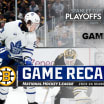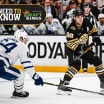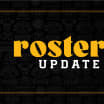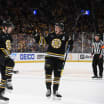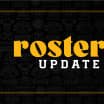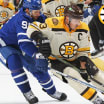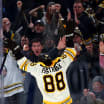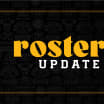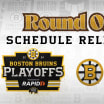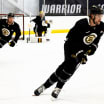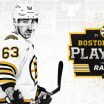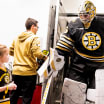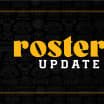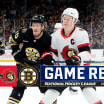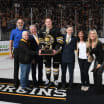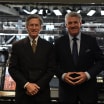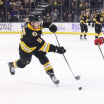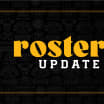BostonBruins.com -Fifty years have passed since Bobby Orr cemented his legendary status with his iconic Stanley Cup-clinching goal in Game 4 of the Final against St. Louis on May 10, 1970.
In the decades since, the photo of that championship tally has become mythical in its own right, hanging on the walls of bedrooms and barrooms across the world. The video has been seen over and over and over again by millions, while the stories from that day have come together to form somewhat of a fairytale.
And for the lucky collection of people that were inside Boston Garden on that sweltering Mother's Day afternoon, the images of that day still remain vivid after all these years.
With the golden anniversary of one of Boston's finest moments set for Sunday, eight Bruins season ticket holders that were in attendance that day have summoned those memories.
This is the story of that unforgettable afternoon as told by some of the people who experienced it firsthand.
The Goal | From The Stands
Eight season ticket holders remember that Mother's Day afternoon 50 years ago when Bobby took flight and the Bruins took home the Stanley Cup
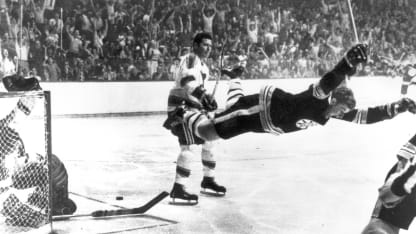
It was Game 4 of the 1970 Stanley Cup Final. The Bruins led the series, 3-0, and were aiming to sweep the expansion St. Louis Blues. With future Hall of Famers Orr, Phil Esposito, Gerry Cheevers, Johnny Bucyk and head coach Harry Sinden leading the way, the Black & Gold were on the verge of glory.
Kevin Vautour, a long-time Bruins season ticket holder, was just 19 years old that spring.
Vautour: "Everything built up as the season went on. Remember, they had been out of the playoffs for eight straight years. They were just coming back into their own. It was the third year of the Orr-Esposito era and people could actually believe that, 'Hey, they could win the Cup this year.'"
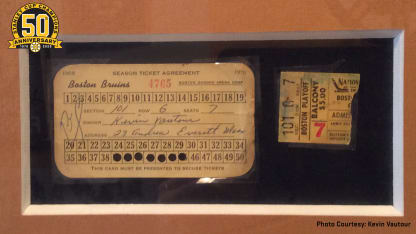
While the Celtics had captured titles in 11 of the previous 13 seasons, Boston's other major sports teams were struggling to keep up.
The Bruins were without a title since 1941. The Red Sox were still basking in the glory of the 1967 Impossible Dream but had not won a championship since 1918. And the Patriots, formed just 10 years earlier, were still finding their footing.
The city's fans were starving for another success story, among them Skip Fryling, who was 30 at the time and three years into his now 53-year tenure as a Bruins season ticket holder.
Fryling: "Hockey was starting to catch on. What triggered us in the beginning was this kid Bobby Orr was coming up. [A few years earlier], there was five of us in a pub in Scituate, single guys at the time. We each bought one ticket...hockey was just starting to evolve, and Orr was bringing a new excitement…[Derek] Sanderson, all those guys."
Orr - considered now to be, perhaps, the greatest hockey player of all time - and the 1970s-era Bruins were unquestionably the driving force behind elevating the sport to new levels in New England. Their popularity made that Sunday afternoon one of the toughest tickets in Boston sports history.
Fryling: "It was Mother's Day and one of the other gentlemen couldn't make it so he said, 'Hey, do you want to take Mary Ann, so I asked [my wife] Mary Ann and she said, 'Sure, but we've got twin daughters that are two-and-a-half.' We found a babysitter and away we went."
Scott Colwell was only 13 and was shocked when his father, a long-time season ticket holder, offered him his seat for Game 4.
Colwell: "Right around that time, my grandfather got really sick, so my dad was letting me go to the game. I actually saw almost all the playoff games in that season…at the time he said, 'These guys are young, they're gonna win Cups for years. I'll let you see this one.'
"I remember driving in [from Westwood, Massachusetts], went with some neighbors who had season tickets. They couldn't believe that my dad gave me the ticket. People were flying flags, everybody had bumper stickers on their cars for the Bruins."
Jim O'Leary, who was living in Brighton, Massachusetts, was also 13 that spring.
O'Leary: "I was always a big hockey fan, grew up playing. And my brother-in-law had seats in the first row of the balcony right near the little press area. I had gone to one game with him in the past and I remember him calling and asking me, 'Hey, how would you like to go to the playoff game?' I was ecstatic."
Murray White, who lived a few miles away in Dorchester, was 25 years old and his family had owned season tickets since 1959.
White:"I took the subway in for a nickel! My wife stayed home. I took a friend…I wasted a ticket on him when I could have taken her…now I haven't seen him in 40 years. I'm saying to her, 'Why did I waste a ticket on him? You could have been at the game!"
Vautour was by himself when he made the trek into Boston Garden from his home in Everett, Massachusetts.
Vautour: "Hard to believe it was 50 years ago and I remember what I was doing. But it was Mother's Day. I remember that morning I took the bus to Everett Station where the Orange Line started - right where the casino is now. That's how I started the trip. I got on the train and went into North Station."
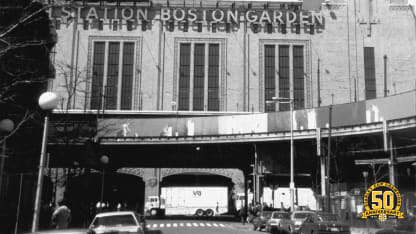
Outside of the game, the lead story that afternoon was the oppressive heat, as temperatures soared into the 90s. The old Garden did not have air conditioning.
White: "I'll always remember, it was hot as hell in the Garden."
Vautour:"The game started at 2:05 in the afternoon and it was hot, it was a real hot day. The Garden was sweltering. Of course, we had no air conditioning. They still sold beer by the bottle back then. I wasn't old enough to drink, but I can still see the guys getting the bottles out at the concession stands."
The scorching temperatures did not dampen the excitement and anticipation, however. Neal Salloway, 19 at the time, was with his father and a cousin in Section 115.
Salloway:"Was part of the old Gallery Gods. I had four tickets. We had a perfect view. I was right on the red line, right at center ice. We knew everyone in our section in those days. It was almost like a family every night…you saw the same people twice a week forever. We had a great group.
"I just remember the atmosphere. It was unbelievable. [The Garden] held 13,909 and I think there were 16-17,000 people in the building. It was electric in there. People banging on the rafters. It was so loud. It was incredible.
"After the Chicago [semifinal] series when they swept them and all the games against St. Louis, we were pretty psyched. All you heard throughout the whole building, everywhere you went was, 'the Cup's in the building, tonight's the night.'"
Colwell: "It was a party atmosphere. That place. It was just rocking. It was crazy. The noise level - it was just unbelievable how loud it was."
White: "Everybody was thrilled. St. Louis was an expansion team. How could you lose to St. Louis? In those days, I think they had two rounds or three rounds if that. It was a shoe-in. 'How could they lose?' basically was the feeling."
O'Leary knew good things were in store after a special interaction with Bruins winger Eddie Westfall during warmups.
O'Leary: "I definitely got the full experience from the time we arrived. Before the game, we went to the bench. My uncle was very good friends with Eddie Westfall; I yelled out to him and he came over and gave me a puck. The whole day started off with a little bit of excitement.
"The seats we had were awesome. Just the experience all day. I tell people I was there and they say, 'Ya, you and 100,000 other people.' But it was one of the great events of my life."
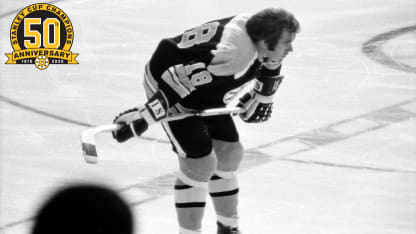
It was a tightly contested affair with the game sitting even after each period. Bruins blue liner Rick Smith opened the scoring at 5:28 of the first and Blues star Red Berenson tied it up at 1 with 43 seconds to go in the opening frame.
Gary Sabourin gave St. Louis a 2-1 lead at 3:22 of the second, before Esposito knotted things at 2 for the Bruins with 5:38 remaining in the middle period.
Just 19 seconds into the third, Larry Keenan once again gave St. Louis a lead with a power-play marker. But Bucyk - then in his 13th season with the Black & Gold - evened it at 3 with 6:32 to play in regulation.
Colwell: "When they tied it up in the third period, I think the whole feeling of the crowd just electrified and everybody felt like, 'This is it, they're gonna win it.' That's how the flow of it went. There was a little bit of tenseness but also confidence that they were just too good. Orr was too good."
Indeed, he was. At the start of overtime, Sinden, worried his top two lines would be a bit too excited, opted to start the line of Wayne Carleton, Derek Sanderson, and Westfall. Orr and partner Don Awrey manned the points.
White: "I think we were losing by a goal at one time and then we tied it up. And everybody knew when Orr stepped on the ice they were gonna win."
Colwell: "My dad had great seats. We were in the first row of the balcony. Because it was overtime, they were shooting down the other end, it was at the opposite end of the rink. But we were on the blue line so we could see everything. Whenever [Orr] made a move on the puck, the guy was so good you just always knew that there was gonna be a chance."
Bill Chase, then 35 years old, had owned season tickets since 1959. He was sitting directly behind the St. Louis net with the goal judge immediately to his left.
Chase:"You could see everything. And if you sat near the crack in the glass you could hear everything too, which I could. We knew that it was gonna happen the way the Bruins were playing, that it had to happen for the Bruins the way it did."
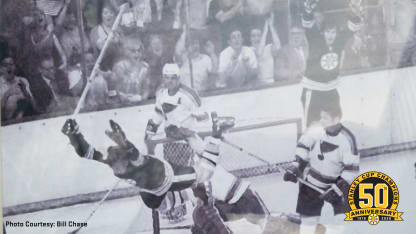
It certainly played out to perfection. Sanderson lost the overtime's opening faceoff to Berenson, but St. Louis failed to make a play through the neutral zone and the Bruins started back up the ice.
After shots by Awrey (blocked) and Sanderson (wide) missed, Awrey pinched down from the left point and poked the puck into the left-wing circle where Westfall tapped it over to Sanderson, whose shot was wide and rimmed back around the boards.
It was at that moment that Orr crept down from the right point to keep the puck in along the wall. Orr then fed Sanderson behind the net.
White: "I was down in Section 104. It was the other end of the ice, so it was hard to see because it was foggy and everything…[Orr] came right down over the right wing."
Chase:"Fortunately, we were right on the ice behind the net. You could see it all setting up. Orr passed the puck to Sanderson and Orr skated up…you had to hear the roar that was starting in the stands when they saw Bobby Orr start down from the point. People started to scream and yell."
O'Leary:"It was great anticipation. Any time he touched the puck, you thought he was gonna score. That was nothing new."
Colwell:"You could just see it happening. I don't think there were too many people that weren't in their seats [after the intermission]. I think a lot of people sensed it…there was just feeling that it was gonna happen."
Fryling:"Derek was in the corner to my left. You could see [Orr] coming down and he laid it out and Bobby was heading right toward our corner."
The rest is history. At 5:10 p.m., Sanderson zipped a pass back to Orr out in front and No. 4 batted it past St. Louis goalie Glenn Hall, before taking flight with a Stanley Cup championship - and one of the most iconic moments in sports history - now secured.
Chase:"Sure as hell, Sanderson passed him the puck perfectly and he zipped it past Hall. It was very, very, very memorable."
White:"I don't know how the puck went in; you couldn't see it from where I was. You could see the red light go on and Orr's feet going up in the air and Sanderson hopping on him."
Vautour: "It happened so fast. I think for a second, I was like, 'What just happened? And then the place went crazy…it was kind of breathtaking."
Colwell: "When he scored that goal, you could feel it. That whole building just shook. It was just unreal. It was painful even, it was so loud."
O'Leary: "I thought I was gonna go over the railing. My brother-in-law had to kind of restrain me. It was just an incredible experience. One of my great memories…the moment was kind of frozen in time."
Fryling:"[St. Louis defenseman]Noel Picard wasn't happy, so he took Bobby's feet out. Hey, Bobby didn't care."
At that point, the party was on as fans joined in on the celebration of the fourth Cup championship in Bruins history.
Vautour: "When Orr scored the goal, the place went absolutely berserk. Along the sides of the rink, the glass was real low so people were able to scale it and go onto the ice. There had to have been a couple hundred people on the ice right after the goal was scored.
"I certainly appreciated it. But the people around me had been waiting for a long time for a Cup. The guy to my left, the guy's name was Beano. He had to have been 70 years old and he was going crazy. Everybody was hugging each other, people you didn't know."
Colwell: "People just didn't stop. All these kids were jumping over the glass cause the glass wasn't that high back then. People were running on the ice, chasing guys down. It was just a circus."
O'Leary: "I grew up in Brighton and I saw two or three of my buddies running around on the ice. One of them to this day, there's a great photo of him beside one of the players holding the Stanley Cup. I was just kind of in awe of the whole celebration. It was euphoria. It was just a great time."
Chase:"Nobody left the building. Everybody stayed. It was just unbelievable how nice it was."
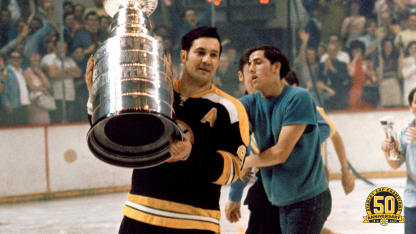
After the initial celebration began to dwindle, the players lined up for an unconventional handshake line, followed by the Cup presentation.
Vautour: "The players started to mill around down by where Glenn Hall was, that's where the handshake line started. It wasn't an even handshake line; it was kind of weaving back and forth. It wasn't traditional like you'd see today. This went side to side kind of in a snake-like fashion.
"I remember Orr going along the boards by the Bruins bench, which was the North side of the building, which would be on my right a little bit. I remember him going on that side and talking to somebody. It might have been his father. I remember somebody leaning over the glass and talking to him and then he kind of gets lost in the crowd.
"Teddy Green didn't play that year because he had gotten injured in the preseason, but I can still remember him having this white turtleneck jersey on with kind of a pink jacket, so he kind of stood out. Everybody was hugging him. He was such an integral part of the team up until he got injured. I do remember that during all the commotion."
White: "The worst thing was they didn't celebrate like they do now on the ice. They brought out the Cup and as soon as they brought it out, Bucyk brought it off the ice within two minutes and that was the last you saw of them."
Nevertheless, the party raged on, as thousands of fans exited the Garden and joined thousands more that were already gathering on Causeway Street.
White: "The horns were blaring when you got out of the game. Cars were beeping. The yelling - thinking of it now, I'm laughing. What a thrill."
Fryling: "I've never witnessed anything like that. When we left the Garden all the horns were blowing. It was crazy, it really was. We had to go home, of course. We couldn't hang around and go bar hopping. We had two kids at home. But outside, just getting out of the place was crazy. And no problems. I don't remember seeing anything bad, everyone was so happy."
Salloway: "It was bedlam. People were just screaming and hollering, celebrating. But there was no violence, nobody was tipping over cars. Just a real exciting night. Outside was bedlam but everyone was having a ball. We hung around for a while and took it all in. It was something I had never experienced, had never seen the Cup in person. It was just an exciting scene everywhere."
Vautour: "I can remember that there were literally hundreds of people down there [at the bottom of the stairwell], so it made it difficult to get out. I still remember people passing beer bottles from inside the Iron Horse [bar] out into where everybody was kind of gathered around. Everybody that had a convertible had their tops down and just raising all kinds of heck. I had never seen anything like it in my life to that point."
The drives home from the Garden were just as chaotic. Don Belcher, a Bruins season ticket holder since 1995, was only four years old at the time, but remembers vividly the stories his 94-year-old mother, Bev - who still watches every game - told him about the ride home to Saugus.
Belcher: "She tells me when [her, my father Bob, grandfather Clarence, and grandmother Mildred] left the Garden, they drove up Route 1 and they were blowing the horn the whole way. They came home, checked on me and my brothers and then went to The Ship restaurant [in Lynnfield] to celebrate because it was Mother's Day."
Salloway also made the trek up Route 1 on his way home to Lynn.
Salloway: "Horns were honking all the way up Route 1. Over the bridge, which was then the Mystic River Bridge, now the Tobin…everybody was into it, the whole town was into the Bruins then. That's all anyone talked about wherever you went…Bruins fever was everywhere."
Colwell: "I lived in Westwood, so we came out on the Southeast Expressway. We were parked right in the North End. All the way down the Expressway, heading through the South Shore, people were just screaming out their windows, waving out their windows, honking horns. It was crazy."
The celebration continued the next day with the Stanley Cup parade, which had the players propped up in open-air convertibles. It was capped by a rally at Boston City Hall.
Vautour: "People were running up to them and hugging them, kissing them. All the players. The Beatles back in the 60s, how popular they were, the Bruins were as or more popular than the Beatles were that day and during that era. It was unbelievable how much fandom they had. They easily were the most popular team in town, without a doubt. People had waited 29 years. They let out a lot of steam. It was tremendous."
Colwell: "The busing issue was really hot then. There was a lot of crap going on that really hurt the city and the city's reputation. And then you had the Vietnam War going on…kids were fighting with their parents about that…but the one thing that brought everyone together was hockey.
"Everybody loved the Bruins, everybody loved hockey. It was a unifying thing for the city and the region…nobody cared about all the other [stuff] that was going on. I think that was really an important thing for Boston. We needed it. Everybody rejoiced in it."
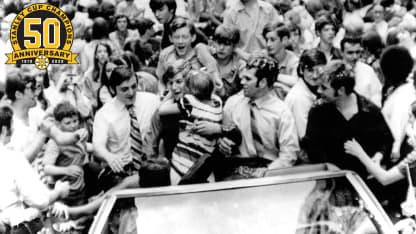
Fifty years later, the city is still rejoicing in that special cast of characters - a group that spawned generations of hockey fans and continues to capture the imagination of an entire region.
White: "It was the greatest thrill of my life…Bobby Orr was the greatest thing I ever saw. He was in a class by himself. All the years I've followed hockey, I've never heard a bad thing about him anywhere. He's such a gentleman."
O'Leary: "[Orr] was such a great athlete, but as good as he was on the ice, he's just as good, if not better, off the ice. He's just a class act. And not everyone carries themselves that way. I think he's just an incredible ambassador for the NHL and the sport of hockey overall. And he's just got all the great attributes that you want your kid to idolize."
Colwell: "I can't believe it was 50 years ago. I still remember the whole thing like it happened yesterday. I just felt so lucky to be there and be a part of it. It was just that whole era. Everybody skated, everybody played hockey. They were building rinks everywhere.
"It was an unbelievable time…they were an amazing team, so much personality. I'll never forget it. I feel lucky to have seen those guys play and see Orr play. Just an incredible run."

